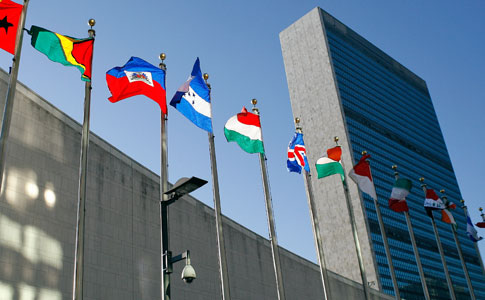NOTE: This guest post was written by Sarah Valero. Sarah is a first year graduate student at the Seton Hall School of Diplomacy and International Relations. Her specializations are in International Law/ Human Rights and the Asia Region. Her interests are in immigration, especially with refugees and internationally displaced persons and Asian foreign policies. She is also the incoming President of the Graduate Diplomacy Council. Ms. Valero is pictured on the front page of the blog with Guy Ryder, Director-General of the International Labour Organization.
The ECOSOC Integration Segment kicked off on March 30th with the theme of achieving sustainable development through employment creation and decent work for all. The three days of the summit brought leaders from countries, organizations, and non-profits to create dialogue and understand what job creation means from different perspectives. The following are a number of themes that overlapped among the panelists. These show that the dialogue we share among our peers and in the classroom is happening at the UN.
Social protection and inequality
The developing world has a greater population of the workforce in the informal sector, where some countries have little to no social protection such as labor unions, access to social security, and creation and enforcement of labor standards. The risks of working in the informal sector are real, as 2.2 million die every year from work related accidents. The problem is that the divide between formal and informal creates inequality of protection for workers. The panelists emphasized that inequality undermines development because of lack of equitable distribution, low productivity, and an imbalance among regions to name a few. They spoke of distributing global wealth, improving the normal income, and focus on education and training of workers. By implementing cooperation, economies can work together to make formal work the norm and provide sustainable economic growth with better labor standards.
Job creation and sustainability
During the Big Think on Jobs and Growth, the panelists discussed how the lack of aggregate demand and redistribution of wealth was one of the main reasons for the lack of jobs growth. The problem is that the wealthy are not putting more money into the economy by not spending and that demand for these products are not as equal as the surplus of supply. Min Zhu suggested that the supply side of economics is the frontier of job growth and that the demand problem is difficult to solve. Dr. Joseph Stiglitz added the importance of having more assets than liabilities to produce less debt. One main agreement from all panelists was to shift taxes away from labor and tax other utilities, such as implementing a carbon tax. While implementing a carbon tax could cut the deficit by $1.1 trillion, taxation is still not popular in the developing world. Regardless of recent success, there should not be an end to the drive for sustainable development and the continuing process of making developing countries developed.
Women and Youth in the workforce
There was an emphasis on womens’ rights and increased participation in the work force as well as encouraging the youth to realize the importance of sustainable development and job growth, in order to avoid unemployment and finding alternative ways for income. For example, in Africa the current figure of 200 million people aged between 15-24 will double by 2045. With those numbers, there has been an emphasis on youth development and the importance of receiving an education and entering the work force. This will ensure that youth that are less educated do not fall into alternative and possibly illegal sources of income. Daniel Funes de Rioja brought up the Global Apprenticeship Network, designed to encourage the development of skills and employment opportunities for youth.
The different panel discussions provided a time for open dialogue to discuss the possible solutions for job growth and sustainable development. Sustainable development is goal that all nations should strive to achieve. This panel not only showcased the kind of people that ECOSOC brings together but also highlighted the fact that people want job growth and that they want better opportunities and protections for those who need it.
